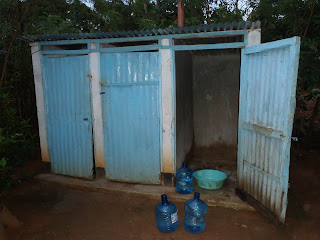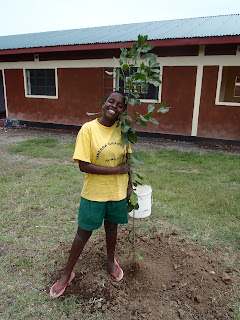 |
| the girls. |
In order to give you a better picture of what the last few weeks have been like, I thought I'd take the time to describe the people we lived with and the lifestyle we led.
 |
| our house. |
We stayed with the family of a man who three years ago was a teacher at one of the schools that Michael was working at. After working with Michael he turned his land, where he was making bricks and producing maize, into a lush permacultural landscape that now provides his family enough food to feed themselves nutritiously as well as sell some for profit. This includes bananas, peanuts, cassava, sweet potatoes, tomatoes, kale, papayas and much more as well as having hundreds of trees growing and a tree nursery. Needless to say this man, JB, now stands as an example for his community and is the permaculture coordinator in the area, setting Michael up with interested schools and offering consultant work through his farm shop.
 |
| the dining/living room. |
His family (including his wife, five daughters, his daughter in law, her two daughters) welcomed us into their home and really made us feel like part of the family. On the last night the women also joined us for dinner, which is a cultural taboo in their culture.
 |
| Abbie and my room. |
Their house was considerably different than living on Gogar farm. There was no electricity, kerosene lamps and flashlights in the evening (and in the daytime as our house had no windows). We ate very well, but a different type of cuisine. Delicious Chai and peanuts for breakfast with sometimes a sweet potato or bananas (all from JB's land). Ugali (kind of like polenta), rice, meat, kale, chapati, beans, green grams, fish and cabbage for lunches and dinners.
 |
| the toilet. |
Some things took some getting used to (ie. the shower) and realizing the challenges that people face in that part of the world (particularly girls) made me understand how lucky we are to have modern conveniences (like a stove to not have to build a fire to cook daily) that we should be thankful for.
 |
| the shower. |























 On Friday I went to the primary school as they were having a tree planting day. The grade 8s are leaving the school this year (the new school year starts in January) and the principal, Sister Hiltrude, wanted them to leave a mark. After an awkward introduction of myself, in which I had to write my name on the blackboard, I became the guest of honour and got to plant the biggest tree. This isn't quite what I'd anticipated as I just wanted to observe and instead had to give a little speech. Let's just say it wasn't a very good speech, but they were all really excited to plant trees which was inspiring. Every kid wanted a picture taken with their planted tree and as it would take forever to upload all of them, I'll only give you a few. In total around eighty trees were planted, which will make for a cool, shady school in the future.
On Friday I went to the primary school as they were having a tree planting day. The grade 8s are leaving the school this year (the new school year starts in January) and the principal, Sister Hiltrude, wanted them to leave a mark. After an awkward introduction of myself, in which I had to write my name on the blackboard, I became the guest of honour and got to plant the biggest tree. This isn't quite what I'd anticipated as I just wanted to observe and instead had to give a little speech. Let's just say it wasn't a very good speech, but they were all really excited to plant trees which was inspiring. Every kid wanted a picture taken with their planted tree and as it would take forever to upload all of them, I'll only give you a few. In total around eighty trees were planted, which will make for a cool, shady school in the future.